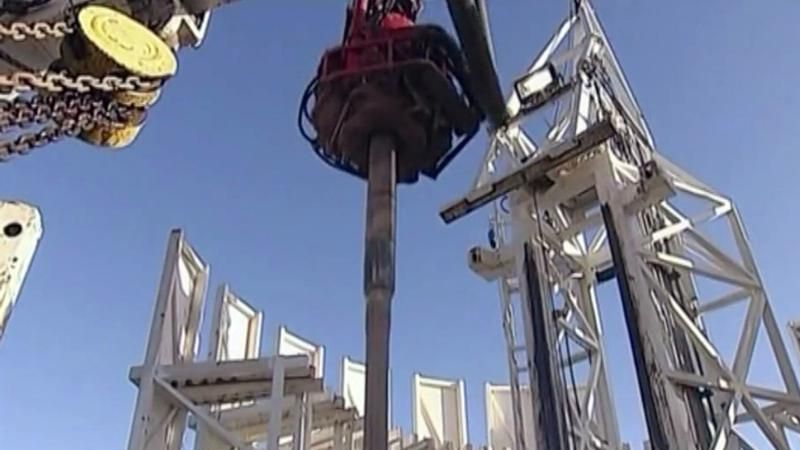Lawmakers OK fast-track 'fracking' bill

House and Senate lawmakers gave final approval Thursday to a proposal that would speed up the start of natural gas drilling in the state.
The House vote was 64-50, and the Senate voted 33-10 without any debate to concur with the House version of the bill.
Senate Bill 786 now goes to the desk of Gov. Pat McCrory, who has already said he supports it.
"We have sat on the sidelines as a state for far too long on gas exploration," McCrory said early Thursday, adding that the industry would "create jobs and also help with our country’s energy independence."
Rep. Mike Stone, R-Lee, agreed.
"It's been a long, long road," he said. "We need to move forward to say North Carolina is in the energy business."
House Democrats tried to amend the legislation 10 times Thursday, but none succeeded.
Republican leaders used a parliamentary maneuver to derail four proposals. Those amendments would have banned the disposal of toxic wastewater from drilling in open pits, required landowner permission to disturb surface land, allowed cities more power in setting rules for drilling and reinstated a 2012 requirement for lawmakers to vote to approve state regulations before any drilling could begin.
The parliamentary maneuver, known as tabling, allows amendments to be killed without a recorded vote on the topic of the amendment.
Rep. Becky Carney, D-Mecklenburg, was angry that her amendment to reinstate the final vote on regulations was not debated. She said legislators of both parties made that commitment when they lifted the ban on drilling in 2012.
"We broke a promise, and you get to go home and say that," Carney said.
Ed Harris, whose Lee County land sits atop a shale deposit that could be drilled, said he is upset with lawmakers for their headlong rush to open the state to gas exploration.
"They don't even have the rules in place they're going to use, but they're going ahead and passing (the bill)," said Harris, 66, whose family has lived in Lee County since the 1880s.
Stone said the rules that are eventually established aren't written in stone and will evolve over the coming years.
"There will be a lot of change that we'll look at," he said.
"My land belongs to me," Harris said. "It does not belong to Mike Stone, it does not belong to (the state Department of Environment and Natural Resources), it does not belong to the Mining and Energy Commission and it doesn't belong to the North Carolina legislature."
A amendment proposed by Rep. Grier Martin, D-Wake, would have banned compulsory, or forced, pooling by removing the state's 1940s forced pooling law from the books.
Martin said forced pooling isn't required for the drilling process known as hydraulic fracturing, or "fracking," noting that Pennsylvania and West Virginia don't allow it.
"This amendment here is not whether you support or oppose fracking. This is about whether you think the government should be able to come in and tell you you have to engage in it,” he said.
Other Democrats compared forced pooling to the abuse of eminent domain and said it would be impossible for oil and gas companies or landowners to value leases if the rules for pooling aren't clear.
"We are transferring and changing the property rights of the citizens of this state," warned Rep. Rick Glazier, D-Cumberland.
Harris agreed, saying, "I should, as an American citizen, have the option of saying no.
"The idea someone can take this from me then turn around and pay me a fair market value for some lumber, how do you put a price on something like this?" he asked.
Republicans argued that forced pooling actually helps landowners who don't sign leases by making sure they share in the profits from natural gas that might be drawn out from under their property and said it's often the poor and uneducated who are left out of profits.
"Forced pooling is to protect the person who has a lot of drilling taking place around them from them not getting anything," said Rep. Chuck McGrady, R-Henderson.
Martin's amendment failed, as did another by Rep. Joe Sam Queen, D-Swain, that attempted to make the chemical recipes of fracking fluid public record.
"The public's right to know should take precedence over corporate secrecy," Queen argued.
Stone called the amendment a "deal-killer," arguing that the industry wouldn't come to the state to drill if its trade secrets weren't protected. He said the proposal was just another attempt by fracking opponents "to find a way to shut it down. "
Martin agreed that trade secrets should be protected, but added, "When your trade secret enters my daughter's drinking water, it becomes my right to know."
Rep. Bill Brawley, R-Mecklenburg, said opponents of the bill were relying on rhetoric and emotion at the expense of the actual contents of the bill.
"We're going to hear a lot of fear about situations that don't exist," Brawley said. "I read the bill. It ain't great, but it is what it is. I'm supporting it."
Glazier argued the benefits of fracking with current technology don't outweigh the risk. "It scares the absolute heck out of me," he said.
Rep. Pricey Harrison, D-Guilford, said she doesn't understand why Republican leaders rushed the measure through the House so quickly.
"Three hundred eighty-seven jobs and 12 days of gas does not seem like it's worth the risk to our natural resources and our public health," Harrison said. "We have plenty of time to get it right. Nothing about this process makes any sense to me."












